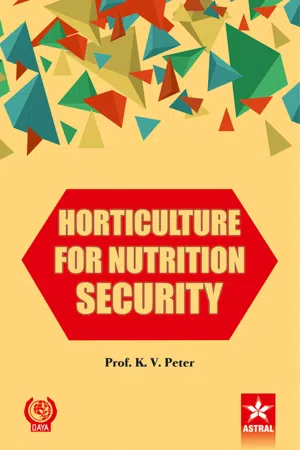About this book
Malnutrition-under nutrition and imbalanced nutrition-is a major health problem in developing and developed countries. The recent National Health Survey-2005-06 says "India loses 2-3 per cent of its GDP every year due to undernutrition among children in the age group of up to two years". According to the report "Nutrition in India" even among wealthy only about 7 percent children between 6 and 24 months receive adequate feeding, health care and environmental health. The FAO of the UN declared 2014 as year of family farming with the intention of making each family a farming unit to meet the nutritional requirement. The Indian National Science Academy focused on micronutrient security as priority for research and action. The National Academy of Agricultural Sciences, New Delhi released two policy papers related to organic farming and related approaches to make homesteads self sustainable. Being a sub-continent enjoying temperate, sub-tropical and tropical climate along with arid climate and a longer coastal eco-system India has the strength of biodiversity, traditional wisdom and adequate natural resources-soil, water and energy. "There is a horticultural remedy for every nutritional malady" says Prof. M.S. Swaminathan. Fruits, vegetables, spices and aromatic plants are the reservoirs of much needed fibre, vitamins, minerals, anti-oxidants, lipids, flavourants, odourants and essential phyto-chemicals. Horticulture for Nutrition Security carries 21 chapters authored by 43 well known scientists. Four preambles are added to get the most authoritative information on Nutrition Security. The book has a FOREWORD by Prof. V.L. Chopra, Former Member, Planning Commission (Science) GOI and Former Director General ICAR New Delhi. The book is devoted to Prof. M.S. Swaminathan, the Father of Green Revolution for his commitment to make India hunger free by 2030.
Tools to learn more effectively

Saving Books

Keyword Search

Annotating Text

Listen to it instead
Information
Table of contents
- Devotion
- Acknowledgement
- Foreword
- Preamble-I Food and Agriculture Organization of the UN-2014. The State of Food and Agriculture-2014 in Brief: Innovations in Family Farming
- Preamble-II Micro-nutrient Security for India: Priorities for Research and Action Report by Indian National Science Academy, New Delhi
- Preamble-III Policy Paper No. 30: Organic Farming: Approaches and Possibilities in the Context of Indian Agriculture Issued by National Academy of Agricultural Sciences (NAAS), New Delhi
- Preamble-IV Policy Paper No. 7: Diversification of Agriculture for Human Nutrition Issued by National Academy of Agricultural Sciences (NAAS), New Delhi
- List of Contributors
- Introduction
- 1. Aetiology and Consequences of Malnutrition and Way Forward
- 2. Economics of Family Farming
- 3. Nutrition Garden in the Context of Nutritional Security
- 4. Good Agricultural Practices and Organic Farming (GAP and OF) 37
- 5. Organic Spices
- 6. Vegetables and our Health
- 7. Advances in Plant Sciences for Nutritional Security
- 8. Food Supplements to Complement Urban Food Security
- 9. Fertility Management for Horticultural Crops in Acidic Soils of Warm Humid Tropics
- 10. Chemistry of Macronutrients Fixation in Acidic Soils
- 11. Rootstocks for Abiotic Stress Management in Fruits
- 12. Abiotic Stress Tolerance in Horticultural Crops
- 13. Shelflife of Fruits and Vegetables-Interventions to Prolong
- 14. Physiology of Spoilage of Temperate Fruits
- 15. Resistance to Abiotic Stress in Vegetables and Spices
- 16. Azadirachtin: Its Structure and Insect Activity
- 17. Nanotechnologies for Crop Production
- 18. Environment-Sensitive Male-Sterility in some Food Crops
- 19. Indigenous Leaf Vegetables
- 20. Potatoes for Nutritional Security
- 21. Urban and Peri-urban Agriculture (UPA) for Food and Nutrition Security
- Index
Frequently asked questions
- Essential is ideal for learners and professionals who enjoy exploring a wide range of subjects. Access the Essential Library with 800,000+ trusted titles and best-sellers across business, personal growth, and the humanities. Includes unlimited reading time and Standard Read Aloud voice.
- Complete: Perfect for advanced learners and researchers needing full, unrestricted access. Unlock 1.4M+ books across hundreds of subjects, including academic and specialized titles. The Complete Plan also includes advanced features like Premium Read Aloud and Research Assistant.
Please note we cannot support devices running on iOS 13 and Android 7 or earlier. Learn more about using the app
